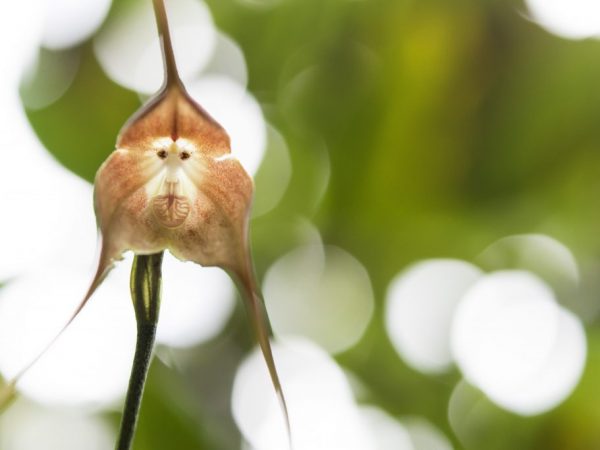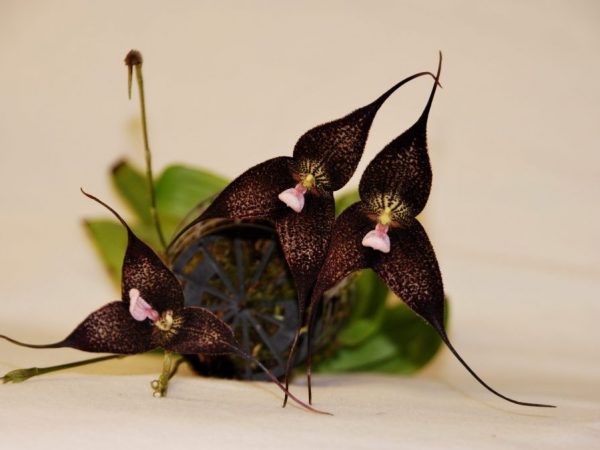Characteristics of the orchid Dracula (Monkey Muzzle)
Dracula orchid is an epiphytic plant of the orchid family. It is often called the monkey orchid due to the fact that its flowers are similar to the face of a monkey. A rare species with high requirements for care and cultivation.

Dracula Orchid
Description of the variety
In nature, the Monkey Orchid grows on the lower parts of tree trunks.
Visually, the monkey orchid flowers are similar not only to the face of a monkey, but also resemble the mouth of a vampire, which is why they got their name - Dracula.
Dracula has many species that differ in shape and color. The most unusual species:
- bella - chocolate-crimson shade with yellow coloring inside;
- chimaera - flowers are yellow, brown, cherry;
- polyphemus - lilac-tinged spotted color;
- bellerophon - light pink petals with pale hairs.
Beautiful zygomorphic orchid flowers smell like oranges. Epiphytic plant of short stature with a short stem and belt-like leaves. There are no pseudobulbs. The leaves are 4-6 cm long and have a spongy structure. Flowers bloom alternately, so flowering takes a long time.
Pollinate the plant:
- the bats;
- bees;
- shrews;
- drones.
For pollination to take place, the flower releases pheromones - substances similar in composition to the secretion of the glands of pollinators. The flowering shoots of the plant are one-flowered, directed downward, straight or slightly drooping.
Growing
Landing
The Dracula orchid grows well at home on the southeast side, it is better not to change the chosen place. IN
Dracula is grown in transparent plastic pots or wicker baskets. There should be numerous drainage holes at the bottom of the containers.
For soil, use a mixture in equal amounts from:
- fern roots;
- pine bark,
- sphagnum moss;
- coarse ground charcoal.
They are planted in sphagnum or coconut flakes. Soil acidity level from 5.5 to 6.5 pH.
The Monkey Orchid is propagated by seeds. This method involves the separation of a part of the plant with 2-3 growth points during transplantation. Sections are dried for 10-18 hours, soaked in crushed coal and planted in different containers. The seeds ripen for 6-8 months.
Due to the lack of pseudobulbs, they propagate with the help of spongy leaves, planting them in wet moss. Young sprouts are recommended to be sprayed daily.

Growing a Dracula orchid
Care
To grow an orchid with a monkey face at home, you must comply with the conditions of detention.
| Agrotechnical event | Application |
| Watering | Depends on the room temperature. Water after the soil is completely dry. Try not to overflow the flower in order to bring it as close to its natural environment as possible. For irrigation, it is recommended to use rainwater, it should not contain chlorine. |
| Temperature regime | In summer, for cultivation, choose a temperature not higher than 25 ° C, in winter - not lower than 15 ° C. In order for the plant to form flower buds, it is important to adhere to temperature fluctuations at night and day at 4 ° C. If the cultivation is carried out in a greenhouse, it is equipped with a fan and air conditioning. |
| Top dressing | Frequent feeding is not required.All dressings are diluted three times. For fertilization, organic matter is used. |
| Transfer | They are transplanted if salinization and compaction of the soil occurs, or the roots are seen from under the soil. For transplantation, a time is also chosen when young shoots grow their own roots. |
| Maintaining humidity | An orchid in the form of a Monkey's muzzle needs moisture. It grows successfully at 70-90% humidity |
Maintaining a special microclimate promotes germination of the sprout. Dracula reacts negatively to direct sunlight and summer heat. It blooms all year round, but only with strict adherence to the rules of care, which should practically not differ from natural ones.
Dracula is grown at home under a phytolamp. It does not require pruning.
Pests and the fight against them
Monkey orchids are exposed to many diseases and pests:
- whitefly;
- aphid;
- herbivorous mites;
- shield;
- fungus;
- thrips.
To combat thrips, a solution of garlic is used: 700 g of unpeeled garlic bulbs are finely chopped, 10 liters of boiling water are scalded and boiled for about 4 hours. After it is filtered and diluted in 1 liter of water.
Against whitefly, spray with calendula tincture. To get rid of aphids and scale insects, wipe the leaves with a solution of laundry soap. To do this, stir 150 g of grated soap in 1 bucket of water.
Diseases
Diseases of the Orchid Monkey:
- black rot;
- fusarium;
- gray rot;
- anthracnose.
In the early stages of the disease with rot, it is necessary to cut off the damaged areas, and treat their edges with preparations that contain copper and crushed coal. Against fusarium, treatment three times a day with a 0.2% solution of foundationol helps.
When the flower dries, dry roots and leaves are cut off. Then they put it in water so that the neck is completely immersed. The water needs to be constantly changed. When new roots and shoots appear, the flower is planted in a container. The rotten root is cut and dipped in crushed coal. Then they are planted in a new soil covered with sphagnum.
Conclusion
Dracula Orchid (monkey face) is a beautiful and exotic plant, but finicky. It can be grown at home, but this will require careful maintenance.


